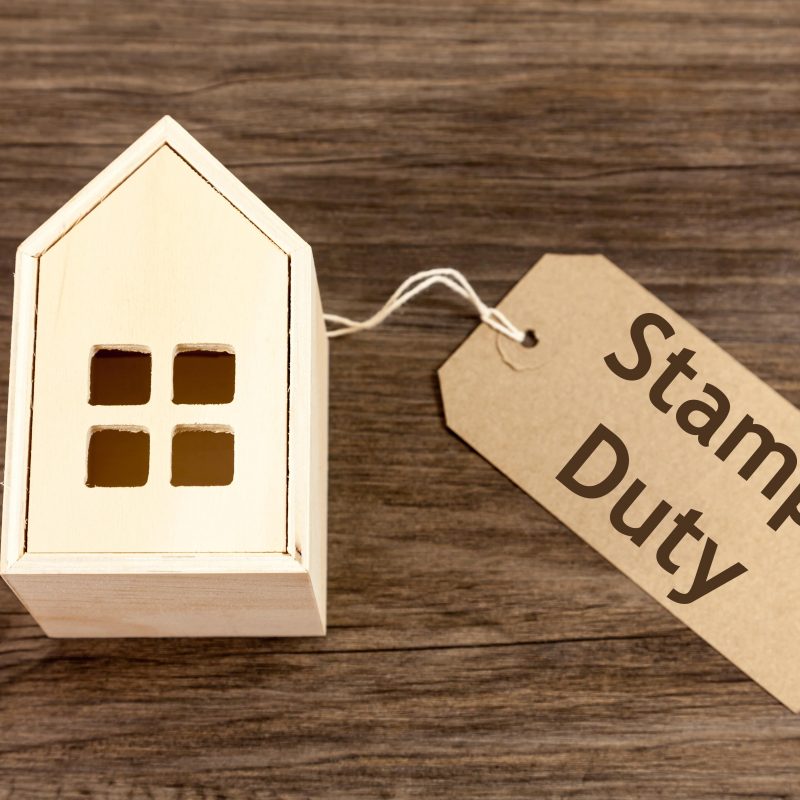
To give a much-needed boost to the property market and in a bid to drive demand, the Government announced in July 2020 a stamp duty holiday for residential property purchases under £500,000.
For non-residential premises and land, the figure has been set at £150,000.
What is stamp duty?
Stamp Duty Land Tax (SDLT) or more commonly referred to as stamp duty, is a tax payable when anyone buys a flat, house, or land and buildings over a certain price in England and Northern Ireland. Scotland pay Land and Buildings Tax and Wales pay a Land Transaction Tax and have their own stamp duty schemes.
The tax thresholds are set by the Chancellor and change from time to time. The current threshold is £500,000 and any property purchased below this figure will not be subject to stamp duty on transactions which are completed by 31st March 2021. This will apply to any transaction whether it is a first-time or subsequent purchase.
There are changes that apply from 21st April 2021, where the following thresholds are applicable:
- Residential property - £125,000
- Non-residential property and land - £150,000
The situation is different for first-time buyers after 21st April 2021 as they have a higher threshold and the following applies if:
- You or anyone else you are buying with is a first-time buyer; and
- The purchase price of the property is £500,000 or less
You can determine how much stamp duty you are likely to pay on a purchase by using the Stamp Duty Land Tax calculator which you can find on the gov.uk website.
How is it paid?
An SDLT tax return must be sent to HMRC within 14 days of the purchase completion. In practice, a online solicitor or conveyancer will file the return and pay the tax on the purchaser’s behalf on the day of completion and add it to their fees.
What is a stamp duty holiday?
It is estimated that the stamp duty holiday affords that nine out of ten home purchases will be free of the burden of paying tax until the end of the deadline. The holiday ends on 31st March 2021 and in order for a purchase to be free of land tax you have until then to complete it.
Because the stamp duty holiday has caused a surge in property sales and demand is showing no signs of abating, many working in the property sector have urged the Chancellor to extend the stamp duty holiday. This is to avoid the unpalatable situation where too many transactions are vying with each other to complete before the end of the holiday period.
This is a problem, as stamp duty is only paid upon completion. If a home purchase fails to complete before the 31st March 2021 deadline, then the 'normal’ rates of stamp duty will apply even in cases where the purchase had started when the holiday was in place.
How much is stamp duty?
| Property Value
£ |
Old Rates
£ |
New Rates
£ |
| 100,000 | 0 | 0 |
| 200,000 | 1,500 | 0 |
| 300,000 | 5,000 | 0 |
| 400,000 | 10,000 | 0 |
| 500,000 | 15,000 | 0 |
| 600,000 | 20,000 | 5,000 |
| 700,000 | 25,000 | 10,000 |
| 800,000 | 30,000 | 15,000 |
| 900,000 | 35,000 | 20,000 |
| 1,000,000 | 43,750 | 28,750 |
| 1,100,000 | 53,750 | 38,750 |
| 1,200,000 | 63,750 | 48,750 |
| 1,300,000 | 73,750 | 58,750 |
| 1,400,000 | 83,750 | 68,750 |
NOTE: The above table applies to purchases made between 8th July 2020 and 31st March 2021 in England and Northern Ireland.
Strain on the system
Trade bodies, such as NAEA Propertymark have called for an extension to the deadline citing concerns about the ability of the system to cope with so many completions rushing towards a March 31st deadline. Indeed, when you factor in staff shortages due to Covid-19 there is real concern that there will not be sufficient capacity for conveyancers, surveyors, mortgage lenders or estate agents to cope with demand.
The Society of Licensed Conveyancers (SLC) and the Conveyancing Association (CA) in a joint statement lobbied the government, stating it is essential to extend the stamp duty holiday ‘to avoid further disappointment in the spring.’ Backlogs in the system caused by increased demand as people reappraised where they lived during the first lockdown and driven by surplus transactions put on hold during that time has resulted in the conveyancing process being stretched to the limit.
What can sellers and buyers do to avoid missing the deadline?
Property transactions can usually take a few months to complete in normal times, even when there is no chain involved. But with the imposition of the second lockdown until 2nd December 2020 and the uncertainty as to whether it will be extended, the situation is becoming increasingly pressured by those responsible for making transactions happen.
Ideally, sellers should have listed their property on the market by the end of September 2020 in order to maximise the likelihood of getting a sale over the line by 31st March. And buyers hoping to take advantage of the stamp duty holiday should being looking for a property before 1st November or risk missing the deadline entirely. Sellers should allow at least four months to complete their housing transaction.
It has been estimated that because approximately 450,000 property transactions were held in limbo following lockdown in March 2020, its knock-on effect will be the purchasing process will take much longer than in otherwise ‘normal’ times.
Potential delays to the process are:
- Search providers and mortgage lenders may have longer delivery times due to Local Authority departments and Property Surveyors being shut down during lockdown or from staff absence due to self-isolating. All these things take a toll on time scales and should be considered in any sale or purchase where hoping to take advantage of the stamp duty holiday.
- Because the conveyancing process relies on great swathes of information and data being obtained to make sure the property is suitable, any delay in information coming through will naturally have an impact on how quickly the process can progress.
- If someone in the chain develops coronavirus or is required to self-isolate because they have come into contact with someone that has, the process could be delayed for at least two weeks and possibly longer if wider family has to isolate.
- Face to face viewings will be stalled if someone in a household becomes ill with coronavirus and has the result of extending the timeframe of the sale.
- Legal offices and estate agents may be understaffed during this time and hold up completions or other information gathering processes.
Before the pandemic, an application for a mortgage with clear-cut circumstances took less than two weeks to produce a mortgage offer. Now, it is taking much longer, and in some cases it is taking between three to four weeks and others’ taking four to eight weeks. But it is not just provision of mortgage offers that threaten deadline defeat, the average homebuying timeline has increased to between fifteen and seventeen weeks for buyers with more complicated requirements.
This timescale does not include the second month-long lockdown imposed until 2nd December 2020 or the Christmas break which will both have a sizeable impact on housing transactions. Not to mention the uncertainty regarding an extension to the second lockdown which may also need to be factored in.
The period between exchange and completion has already risen to two weeks and, realistically, if you have not begun to search for a property by the first week of November it is unlikely you will be able to complete the purchase in time for the stamp duty deadline on 31st March 2021.
A call has been made by the director at Legal and General Mortgage Club for policymakers to consider tapering the stamp duty deadline rather than imposing a rigid one. This would avoid those already in the process of selling or buying a property missing out through delays that are beyond their control when the stamp duty holiday ends. However, as it stands there is no suggestion at the time of writing that there will be a tapering or extension of the holiday although pressure is likely to increase on the government as the deadline looms.
Ways to help speed up the process can include (but are not limited to):
- Asking your estate agent for a copy of the Property Information Questionnaire
- Obtaining a copy of the lease if the property is leasehold or freehold documents
- Locating FENSA certificates for replacement windows or doors
- Providing the Energy Performance Certificate (EPC)
- Detailing relevant building restrictions
- Collating building regulation certificates for any alterations to the property
- Gas Safety certificate if a new boiler has been installed.
What happens if completion doesn’t take place by 31st March 2021?
Completion is when the money is transferred to the seller’s solicitors and the buyer gets the keys to the property. Any completion after the deadline date will result in stamp duty becoming payable which is calculated on the purchase price of the property. Any completion that misses the vital deadline of 31st March will be subject to the stamp duty rates as applied by the government at that time.
Recent Posts
- How to Get an Accurate Conveyancing Online Quote
- Mortgage Options Explained – Complete Guide
- Shared Ownership Properties – Eligibility, Benefits and Disadvantages
- How Does Online ID Check Process Work?
- Difference between Freehold and Leasehold Property
- The Difference Between SRA and CLC
- The Key People Involved in House Buying Process
Other Posts
-
25 Jan 2023
Moving home is an exciting but often stressful process. Once your offer has been accepted, you will then need to appoint a conveyancer who will carry out the legal aspects of your property transaction. More and more home movers look to do so by looking online and one of the key steps of the process […]...
-
08 Jun 2022
In today’s market, there are many types of mortgage options and knowing which one is suitable for you is vital if you want to get the right deal. Even though every mortgage tends to function in a similar way, things such as repayment methods, interest rates, and fees can all be different between products. Finding […]...
-
26 May 2022
If you are struggling to find an affordable home, one solution worthy of consideration is shared ownership. This is halfway between renting and buying and aims to reduce the considerable obstacle facing first-time buyers — the need to raise a big enough deposit. For many, shared ownership bridges the gap between renting and getting on […]...
-
13 May 2022
The law demands that solicitors, conveyancing professionals, banks, building societies and mortgage brokers obtain satisfactory evidence of the identity of their clients in order to satisfy Money Laundering Regulations. To this end, there is an increasing demand for methods of online ID check When purchasing a property, the risk of fraud is high because large […]...
-
03 May 2022
Both leasehold and freehold are ways you can own a property and it is important to know the difference because it affects your ownership and the future sale of your home. Leasehold and freehold are principally different forms of legal ownership. If you own the freehold, it means you own both the building and the […]...





